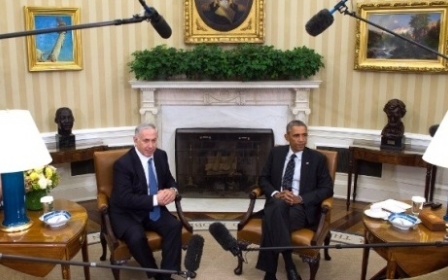Netanyahu secures first coalition deals for new Israeli government

Prospective Israeli Prime Minister Benjamin Netanyahu has taken his first concrete steps towards forming a new government after agreeing a deal with parties Kulanu and United Torah Judaism to join a coalition.
The agreement comes a week before the deadline set by Israeli President Reuven Rivlin for Netanyahu to create a new government, following his Likud party's success in March's legislative elections.
United Torah Judaism (UTJ), one of the country's two main ultra-Orthodox (or Haredim) parties, have sought, and won, an agreement with Netanyahu to limit the penalties applied to Haredim Yeshiva students who refuse to join the Israeli army and establish more control over the quotas applied to the number of Haredim joining the army.
They have also demanded the restoration of around $650mn (2.5 billion shekels) in child allowances, the reversal of cuts to Haredi schools, and free dental care for children up to age 14.
UTJ MK Yaakov Litzman is set to be deputy health minister while MK Moshe Gafni will head the Knesset finance committee.
Kulanu was originally formed by former Likud MK Moshe Khalon in November 2014 after a falling out with Netanyahu over socioeconomic policies – his successful wooing marks a victory for Netanyahu, but is also likely to mark the adoption of certain aspects of Kahlon's more egalitarian socioeconomic policies.
Kahlon is to be given the finance ministry and will also gain control of the planning administration – which is being transferred to the treasury – giving him more control over the banking sector, housing prices and the cost of living.
Kulanu’s second in command, Yoav Galant, is to be appointed construction and housing minister.
Negotiations with the far-right Jewish Home party have so far yet to yield results – a discussion with Jewish Home leader Naftali Bennett, who was previously economy minister and was expected to head up the Education Ministry, proved fruitless after Netanyahu failed to win an extra $260mn for education.
“The Likud offered us a portfolio with no tools and no money,” a Jewish Home source said about the ministry, whose budget is second only to the Defense Ministry.
“They gave the Haredi parties 3.5 billion shekels [$910mn] for sectorial needs and left nothing for the educational system. The prime minister wants us to spend a term putting out fires, with no tools to solve the distress of Israeli pupils.”
The Agriculture Ministry is expected to go to Uri Ariel, who will also be given control of the World Zionist Organisation’s settlement division, a major funding channel to West Bank settlements.
Ayelet Shaked, known for her controversial comments about Palestinian children, will be appointed culture and sports minister.
The appointments have confirmed the predictions of many commentators that Netanyahu would seek to create a hard-right government, dispensing with centrist and liberal figures such as former minister of justice, Tzipi Livni.
"Netanyahu's past modus operandi was to win elections from the right, then try to edge toward the centre when building his coalition. During last month's campaign, however, declining poll numbers led him to believe he had to box himself in to garner enough votes," wrote the Washington Institute's David Makovsky.
"Accordingly, he made clear that he did not want a national unity government with the rival Labor Party, alleging that the policy gaps were too wide. Although this won him adherents on the right, it meant he would not be able to incorporate key leftward voices in his coalition."
New MEE newsletter: Jerusalem Dispatch
Sign up to get the latest insights and analysis on Israel-Palestine, alongside Turkey Unpacked and other MEE newsletters
Middle East Eye delivers independent and unrivalled coverage and analysis of the Middle East, North Africa and beyond. To learn more about republishing this content and the associated fees, please fill out this form. More about MEE can be found here.




